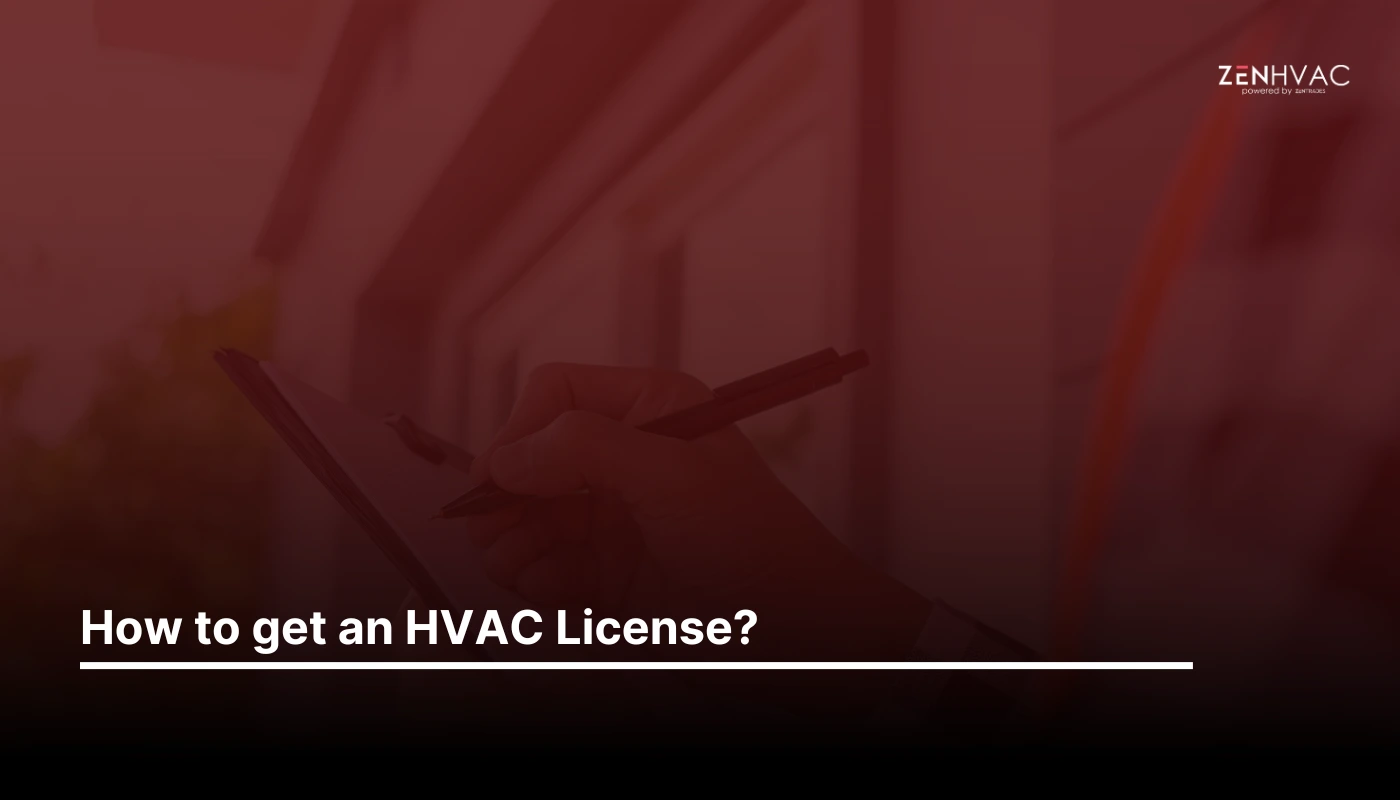How to get an HVAC License?
- Field Service Management
- 9 Min Read
An essential step in developing your HVAC career is earning your HVAC certification. The industry’s safety, professionalism, and quality are put to a standard via HVAC certification. Certification is required in several U.S. states to operate an HVAC company or get employment in the industry.
Since HVAC professionals are in high demand in the United States, getting your HVAC license is wise. 2026, the industry is predicted to reach $82.5 billion after steady growth. HVAC contractors, also known as HVAC technicians, will be more in demand as the business expands; thus, entering this field will be a wise career choice.
The average yearly salary for HVAC contractors is $49,535. Your prospective compensation increases as the degree of your HVAC license does. Contractors typically see a boost in % annual wage of 22% after accumulating three years of experience. No matter your experience level, getting an HVAC license will significantly benefit you as an HVAC contractor, especially if you want to advance your abilities and become an expert in your field.
ZenHVAC has created a knowledge vault for plumbing contractors and technicians like yourself. Head to our website for more informative articles to enhance your business knowledge.
ZenHVAC field service management software can also streamline and optimize your workflow to generate growth and more revenue for your business!
Book a FREE demo today to start streamlining your workflow!
Here What We Cover
What is an HVAC contractor license?
Technicians install, maintain, and repair HVAC systems with the proper licensing. They can do tasks like
- installing HVAC systems in commercial or residential buildings
- removing and changing air filters,
- Setting up solar panels, thermostats, and humidistats
- checking for leaks in the piping systems
- resolving problems with the HVAC system
- examining and maintaining duct systems
Not only is a license for HVAC systems essential in most states, but it also shows that a person is qualified to perform installation and repair work. If you want to work in HVAC, own an HVAC company, or be regarded as a qualified HVAC contractor, your state may have various criteria.

Use our free estimate template now
Make winning quotes in minutes—for any industry and any job.
Why is an HVAC license necessary?
Technicians specializing in heating and air conditioning maintain ventilation, heating, and air conditioning systems. They might do various jobs, including setting up new systems, fixing broken ones, and performing necessary maintenance. An HVAC specialist could, for instance,
- Run tests for leaks and other common issues,
- Connect the equipment to fuel or power sources
- Install new and replacement systems
Because of the work required to install HVAC systems, technicians should be able to read blueprints and mechanical drawings and modify structural components of buildings. For example, they may need to drill holes to install fuel lines or ductwork. This is why all HVAC contractors are required to obtain an HVAC certification.
States' criteria for HVAC licenses
The many HVAC licenses available and the requirements for HVAC contractor licenses vary by state. As you advance in levels, the criteria for these various certifications become more onerous, with the HVAC master license requirements being the most demanding.
State-wide HVAC licenses are not available in the following states:
- Nebraska
- Minnesota
- North Dakota and Utah
- Pennsylvania
- Dakota, South
- Wisconsin, and Washington.
Contractors in these states should confirm the requirements for an HVAC license with their local regulating body.
Once you have the education and practical experience necessary to work independently, you can apply for a license as an HVAC contractor. The minimum criteria are 18 years old, submitting the required application, and paying the $115 charge. You should know what license class and endorsement you want to pursue at the time of application.
Applying does not guarantee you will get a license. You must also pass several screenings and an industry-specific exam PSI testing services administer. Additionally, you will need to maintain minimum insurance requirements set by the state.
Some states have reciprocity agreements allowing one state’s HVAC license to be active in another. These agreements differ; some states allow people to be excused from the application process for HVAC licenses, whereas other reciprocal agreements exempt technicians from a portion of the application procedure. For additional information on the intricacies of HVAC license reciprocity in your state, contact the licensing office in your area.
What is the certification process like for HVAC?
HVAC certification can be obtained in six months to two years through an apprenticeship program; an HVAC appreciation program can take up to five years. To become certified in HVAC, you must complete specific courses.
The actions you must follow to become certified are listed below:
1: If you still need to, get your high school diploma.
For step 2, there are several choices.
2a: You can complete an approved HVAC curriculum. Many of them also consist of Section 608 certification.
The time required to finish this ranges from six months to two years.
2b: Finish the HVAC appreciation program. Three to five years may be required to finish this. Local organizations frequently collaborate to run these initiatives.
An excellent option to receive on-the-job training is through an apprenticeship. It is believed that an apprentice will transition into a journeyman position after working as one.
HVAC technicians can experience working autonomously because this level has less monitoring.
Get posts like this in your inbox.
Keep learning how to run a 5-star business with our bi-weekly newsletter.
Does having an HVAC license boost your earning potential?
Yes, obtaining your HVAC license will boost your income potential. You can do more significant tasks and earn more money if you get your HVAC license. HVAC professionals make an average yearly salary of $ 49,535. However, that average rises as you gain knowledge and advance your HVAC licensing level. Service managers earn 47% more than certified technicians, while qualified technicians make 35% more than apprentice technicians.
Check out our Essential HVAC Salary Guide for a detailed explanation of how much money an HVAC license may bring in. It offers everything you need to launch your HVAC career on the right foot, including geographic income averages, experience earning splits, and HVAC license-level salaries.
ZenHVAC field service management software can also streamline and optimize your workflow to generate growth and more revenue for your business!
Book a FREE demo today to start streamlining your workflow!

Explore a better way to grow your business. Book a free demo now!
Get organized, win jobs, and wow customers.
Book A Free Demo with ZenTrades Today!
Related Reading
Why Your Field Software Management Software Needs QuickBooks Integration
ZenTrades Why Your Field Service Management Software Needs QuickBooks Integration Read More Request Demo...
Read MoreZenTrades How To Manage Electrical Service Agreements Like...
Read MoreZenTrades The Best 5 Jobber Alternatives In 2023...
Read More


